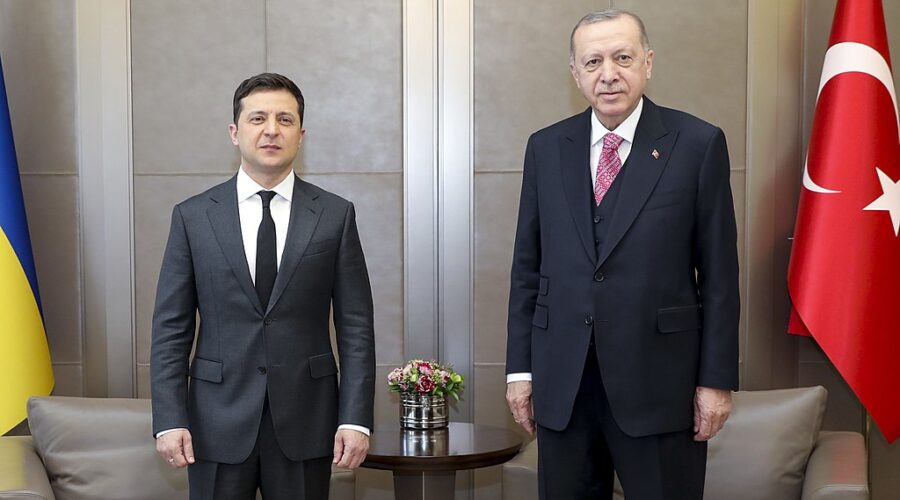Turkey can openly humiliate Russia, and there is nothing Moscow is willing to do about it. The Kremlin continues to demonstrate its weakness vis-à-vis Ankara, while the West is reportedly increasing its pressure on Moscow to keep making “goodwill gestures” in Ukraine.
After Ukrainian President Volodymyr Zelensky, following a meeting with his Turkish counterpart Recep Tayyip Erdogan in Istanbul on July 7, brought home five commanders of the Azov Regiment – Ukraine’s military formation that Moscow declared a “terrorist group” – the Kremlin had to find a way to hide another humiliation it had suffered. Initially, Russia accused Ankara of “violating the deal”, claiming that the Azov leaders should have remained in Turkey until the end of the war.
They were taken prisoner by Moscow during a months-long battle to defend the port city of Mariupol that the Russian forces captured on May 20, 2022. Unlike hundreds of other Azov fighters – who were exchanged for Ukrainian, Kremlin-friendly oligarch, Viktor Medvedchuk – Denys Prokopenko, Svyatoslav Palamar, Serhiy Volynsky, Oleh Khomenko, and Denys Shleha were evacuated to Turkey. In Ukraine, they are seen as national heroes. In Russia, they are portrayed as Nazis and terrorists.
Despite such labels, the Kremlin did nothing to prevent Ankara from allowing Zelensky to bring the Azov leaders back to Ukraine, where they will undoubtedly continue fighting against the Russian forces. Moreover, Moscow was rather careful in its condemnation of Turkey’s actions.
“No one informed Russia about the transfer of the commanders. Their return to Ukraine is nothing more than a direct violation of the terms of the existing agreements”, the Kremlin spokesman Dmitry Peskov said, pointing out that “both the Ukrainian side and the Turkish side violated the conditions of the agreements.”
Peskov, however, stressed that he “perfectly well understands” that there was a lot of pressure on Ankara, which is why, in his view, Turkey, as a NATO member, shows its solidarity with the alliance.
In other words, the Kremlin avoided using harsh rhetoric against Turkey, quite aware that Ankara has strong leverage over Moscow. It is not a secret that Turkey has become a safe haven for many Russian oligarchs who were sanctioned by the West, following Russia’s invasion of Ukraine. Given that that the interests of oligarchs are a major driver of Russia’s foreign, economic and security policies, it is not surprising that the Kremlin is trying to justify Erdogan’s decision to allow Azov commanders to return to Ukraine.
Thus, despite another huge humiliation in the global arena, Moscow will seek to continue doing business with Turkey as usual. It is entirely possible that Russia will once again extend the Black Sea Initiative (also known as the grain deal) agreement with Ankara and Kyiv, even though it repeatedly stated that it “sees no chance” of extending the deal that allows Ukraine to freely exports its grains through the Black Sea corridor.
The fact that the United Nations aid chief Martin Griffiths recently pressured Moscow not to quit the grain deal, and that Turkish and Russian Foreign Ministers, Hakan Fidan and Sergey Lavrov, discussed the Black Sea Initiative over the phone on July 9, perfectly illustrates the Kremlin’s readiness to make another “goodwill gesture”. Even if the Kremlin signals that it might leave the grain deal, its Turkish partners have a mechanism to force the Russian policy makers to extend the agreement.
Unconfirmed reports suggest that the Turkish Navy could protect ships in the Black Sea corridor if Russia decides to withdraw from the grain deal. In other words, NATO-member Turkey would get directly involved in the Ukraine war.
🚨 BREAKING: The Turkish Navy will protect ships from the Russian Navy in the Black Sea corridor even if Putin withdraws from the "grain deal." According to Ukrainian sources, Türkiye confirmed this commitment to Ukraine. ✊ pic.twitter.com/dko3emtrF3
— Igor Sushko (@igorsushko) July 9, 2023
In order to avoid such an outcome, the Kremlin does not seem to have much choice but to extend the deal. Alternatively, if Moscow gets the green light from Ankara to suspend its participation in the Black Sea Initiative, Russia will almost certainly have to make a separate grain deal with Turkey. Indeed, Ankara will preserve its leverage over Moscow regardless of the Kremlin’s decision regarding the Black Sea deal that is scheduled to expire on July 18.
More importantly, Russia will have to continue turning a blind eye to Turkey’s open support for Ukraine. If Ankara proceeds with its plans to build the combat drone plant in the Eastern European country, the Kremlin will have to provide its Turkish partners with firm “security guarantees” that its missiles will not strike the facility.
Finally, despite Turkish actions, Russian President Vladimir Putin will have to continue preserving an illusion that his “dear friend” Erdogan is “a man who keeps his word”. It is very likely that the Turkish leader has promised Putin that he will not be arrested and sent to The Hague if he visits Turkey in August.
Although Ankara has a history of “stabbing Russia in the back”, this time Erdogan will almost certainly fulfil his promise. If Putin ends up in The Hague, there is a risk of large-scale unrest in the Russian Federation. As a result, political forces that are not willing to make deals and compromises with Turkey, Ukraine, and the West may come to power.
In order to prevent such an outcome, the Western policy makers will likely make sure that Putin, his oligarchs and corrupt officials continue pulling the strings in the Kremlin, and keep implementing their “goodwill gesture” policy as long as possible.
Image: Meeting between Ukranian president Zelensky and Turkish president Erdogan in 2021 by President.gov.ua

